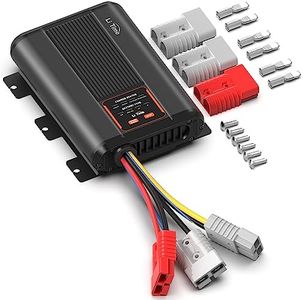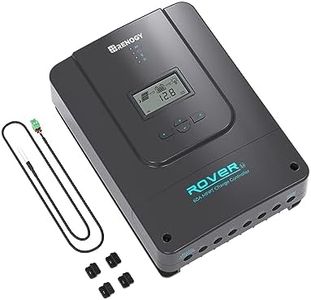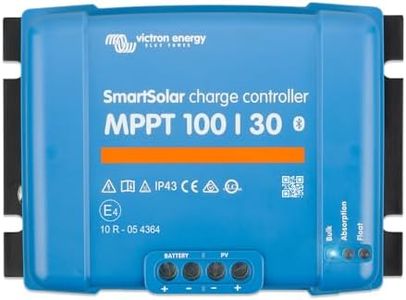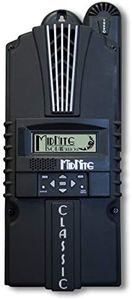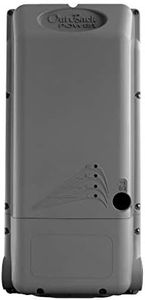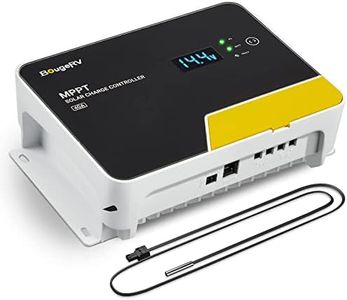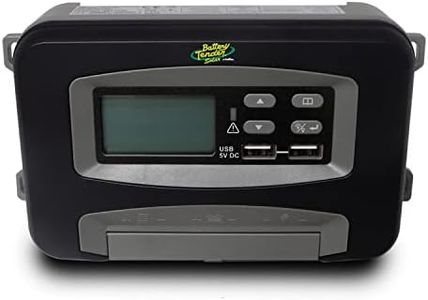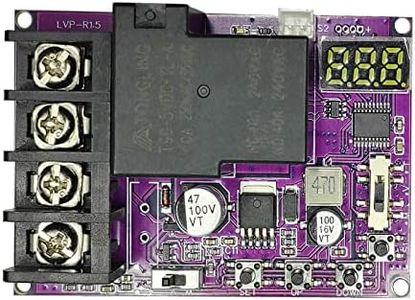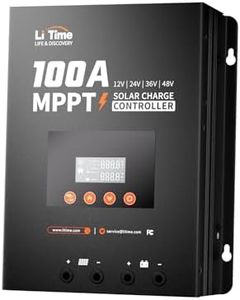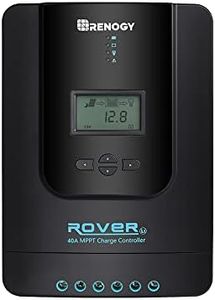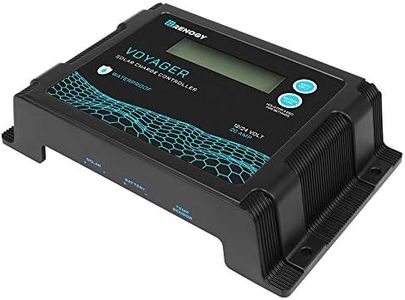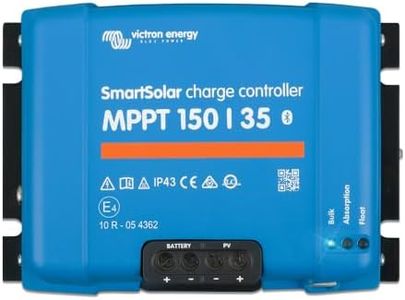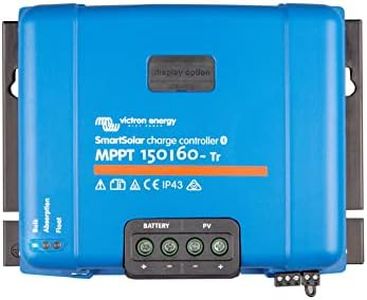10 Best Solar Charger Controllers 2026 in the United States
Our technology thoroughly searches through the online shopping world, reviewing hundreds of sites. We then process and analyze this information, updating in real-time to bring you the latest top-rated products. This way, you always get the best and most current options available.

Our Top Picks
Winner
Renogy 60A 12V/24V/36V/48V DC Input MPPT Solar Charge Controller Auto Parameter Adjustable LCD Display Solar Panel Regulator fit for Gel Sealed Flooded and Lithium Battery, Rover 60A
Most important from
3748 reviews
The Renogy 60A MPPT Solar Charge Controller is a robust choice for those needing efficient and reliable battery charging from their solar panels. Its standout feature is the innovative MPPT technology, which boasts up to 99% tracking efficiency, ensuring optimal energy conversion even in less-than-ideal weather conditions. This controller supports multiple voltage systems (12V, 24V, 36V, and 48V) and is versatile enough to handle different battery types, including Gel, Sealed, Flooded, and Lithium batteries.
The automatic voltage detection and customizable settings for Lithium batteries add to its adaptability and ease of use. The 4-stage charging process for Lead Acid batteries and 2-stage for Lithium batteries, including reactivation for dead batteries, can help prolong battery life significantly. Safety is a priority with this unit, offering comprehensive protection against reverse polarity, overcharging, over-discharging, overloads, short-circuiting, overheating, and reverse current.
The inclusion of an LCD screen and multiple LED indicators makes it easy to monitor system status and adjust parameters as needed. Additionally, the real-time monitoring capability via the Renogy DC Home App enhances user experience by allowing remote access to system performance. On the downside, some users may find the initial setup process a bit challenging despite the easy-to-mount design. Also, while the silent operation due to the integrated heat sink is a plus, those in very hot climates might be concerned about its cooling efficiency without a fan. The Renogy 60A Solar Charge Controller is ideal for those seeking a high-efficiency, feature-rich solution for their off-grid solar systems.
Most important from
3748 reviews
Morningstar Tristar 60A MPPT Solar Charge Controller 12V/24V/48V Batteries, Solar Panel Controller Battery Controller Solar Controller 12V 24V, Lowest Fail Rate MPPT Charge Controller for Solar Panels
Most important from
310 reviews
The Morningstar Tristar 60A MPPT Solar Charge Controller (TS-MPPT-60) is designed for larger solar systems with high-voltage outputs and multiple panels. It is an MPPT type controller, which is generally more efficient compared to PWM controllers, boasting up to 99% efficiency. This high efficiency helps in optimal energy harvest and faster charging times. It supports a wide range of battery voltages (12/24/36/48V), making it versatile for various solar setups.
The controller includes comprehensive electronic protections, such as surge, short-circuit, overload, and reverse polarity protections, which safeguard against potential damage and ensure reliability. It also provides advanced self-diagnostics to notify users of any operational errors and automatic recovery features for continuous protection. The unit allows for extensive monitoring and data logging through MODBUS protocol and MS View software, and it can send email and text alerts, making it user-friendly for remote management.
The remote temperature sensor ensures accurate battery temperature readings, which is crucial for efficient charging. On the downside, the product is relatively heavy at 9.2 pounds and may require professional installation due to its complexity. Despite these drawbacks, its robust build, high efficiency, and extensive protection features make it an excellent choice for mission-critical applications or users with larger solar setups who need reliable and efficient energy management.
Most important from
310 reviews
Victron Energy SmartSolar MPPT Solar Charge Controller (Bluetooth) - Charge Controllers for Solar Panels - 100V, 30 amp, 12/24-Volt
Most important from
5083 reviews
The Victron Energy SmartSolar MPPT Solar Charge Controller is a solid choice for solar energy enthusiasts, particularly those looking to maximize energy conversion and battery longevity. Its MPPT (Maximum Power Point Tracking) technology is a key strength, ensuring optimal power output even in shaded conditions, which is superior to PWM (Pulse Width Modulation) controllers. With a current rating of 30 amps and a voltage rating of up to 100V, it supports both 12V and 24V battery systems, offering versatility for different setups. Efficiency is another highlight, as the MPPT system is known for being highly efficient compared to PWM alternatives.
The controller's connectivity features are impressive, allowing users to monitor real-time data and performance history through the VictronConnect app. This makes system management convenient and user-friendly, especially for those who appreciate remote monitoring and control. Protection features like automatic load disconnection prevent battery over-discharge, which is crucial for maintaining battery health.
However, the controller's relatively high price might be a drawback for budget-conscious buyers, and its plastic construction may not appeal to those seeking more durable materials. Additionally, while the app offers comprehensive monitoring, it does require a certain level of tech-savviness to fully utilize. Despite these minor concerns, the Victron Energy SmartSolar MPPT controller is highly rated by users and boasts a strong reputation in the renewable energy sector. It is well-suited for someone looking for a reliable and efficient solution to manage their solar energy system.
